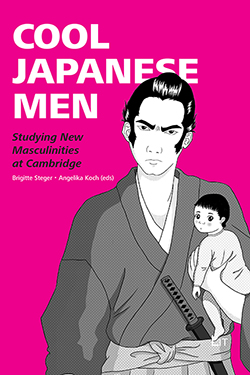| LIT Verlag (2017) |
Following the successful publication four years ago of Manga Girl Seeks Herbivore Boy: Studying Japanese Gender at Cambridge, we are delighted to announce a second book by our recent Japanese Studies graduates. The book has been edited by Brigitte Steger, Senior Lecturer in Modern Japanese Studies and Angelika Koch, former PhD student and Postdoctoral Researcher at Cambridge (currently at the University of Ghent), who also supervised the studies.
Cool Japanese Men: Studying New Masculinities at Cambridge is a collection of well researched and thoroughly up-to-date essays which explore what it means to be a ‘cool’ man in Japan today. Normative ideas of masculinity are currently being negotiated and revised in many societies and these studies make for fascinating reading, both for those with little knowledge of Japan and Gender Studies and those with long-standing interest in these areas. We have every confidence that this book will replicate the success of its predecessor, which is held in many UK school libraries and included on the reading list of university courses on Japanese society around the world. Our hope is that Cool Japanese Men will help inspire many more young people to begin their own exploration of Japanese culture.
Whereas in Manga Girl the men discussed were ‘absent fathers’ and ‘herbivore boys’, a somewhat pejorative term describing men who show little interest in pursuing a career or romantic relationships, the four essays in this new compilation explore what is required to be a ‘cool’ man in twenty-first century Japan.
Hannah Vassallo (graduated with BA in Japanese Studies, 2014) reports on how recent government campaigns promoting the image of ikumen (child-raising fathers) have brought fatherhood into the sphere of ‘cool’ in a marked divergence from the division of social roles of the traditional post-war family system in which ‘absent fathers’ left the burden of childcare to their wives. These new super-hero fathers manage to juggle successful careers with quality family time and may be seen proudly pushing their offspring in strollers and wearing stylish father-and-child matching outfits.
The chapter by Christopher Tso and Shirota Nanase, two current PhD students, examines a range of self-help literature for businessmen seeking to distance themselves from the outdated and decidedly ‘uncool’ image of the colourless and somewhat shabby ‘salaryman’. Two strategies for achieving this makeover are the proto-typically female gendered skills of personal grooming, including the newest skin treatments and the epilation of excessive body hair, and the ability to listen attentively and empathetically to colleagues.
‘Rebellious cool’ is showcased in an ethnography by Sakari Mesimäki (BA Japanese Studies, 2015) of a student hip hop dance circle at one of Tokyo’s top universities. Based on his experience as an undergraduate exchange student and group member, Mesimäki explores how hip hop’s anti-establishment values and emphasis on individuality, originality and competitiveness create new masculinities that differ from those performed in more traditional sport and martial arts clubs.
By way of contrast, the final chapter by Rosie Dent-Spargo (MPhil in Gender Studies, 2015) examines a group of decidedly ‘uncool’ otaku men — the nerdy fans of the pop idol group AKB48 whose members are marketed both as sex kittens and as innocent, child-like figures in need of the protection and support of older men.
Although the focus of this book is Japanese men, all the contributions demonstrate that the creation of masculinities is supported and shaped in no small part by the other gender. Indeed, men are aware of being observed by women, who often wield power as judges of what constitutes ‘cool’ and ‘successful’ masculinity. The studies also raise the question of how deserving these masculinities are of the ‘new’ of our title and to what extent they are influenced by more traditional ideas of how men and women should act. It is no surprise that behind the contemporary veneer of ‘new’ and ‘cool’ in Japan, old habits die hard.

